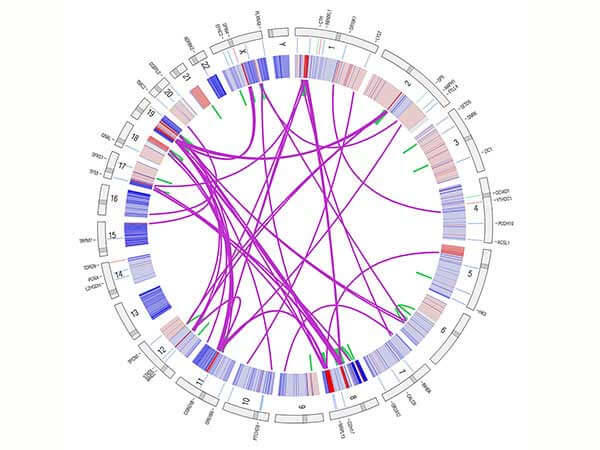
This Circos plot visualizes data from The Cancer Genome Atlas (TCGA) and allows scientists to explore the interrelationships among different data points.
Credit: National Cancer Institute
Why Genomics Research Is Critical to Progress against Cancer
The study of cancer genomes has revealed abnormalities in genes that drive the development and growth of many types of cancer. This knowledge has improved our understanding of the biology of cancer and led to new methods of diagnosing and treating the disease.
For example, the discovery of cancer-causing genetic and epigenetic changes in tumors has enabled the development of therapies that target these changes as well as diagnostic tests that identify patients who may benefit from these therapies. One such targeted drug is vemurafenib (Zelboraf), which was approved by the Food and Drug Administration (FDA) in 2011 for the treatment of some patients with melanoma who have a specific mutation in the BRAF gene as detected by an FDA-approved test.
Over the past decade, large-scale research projects have begun to survey and catalog the genomic changes associated with a number of types of cancer. These efforts have revealed unexpected genetic similarities across different types of tumors. For instance, mutations in the HER2 gene (distinct from amplifications of this gene, for which therapies have been developed for breast, esophageal, and gastric cancers) have been found in a number of cancers, including breast, bladder, pancreatic, and ovarian.
Researchers have also shown that a given type of cancer, such as breast, lung, and stomach, may have several molecular subtypes. For some types of cancer, the existence of certain subtypes had not been known until researchers began to profile the genomes of tumor cells.
The results of these projects illustrate the diverse landscape of genetic alterations in cancer and provide a foundation for understanding the molecular basis of this group of diseases.
Opportunities in Cancer Genomics Research
Although a large number of genetic alterations that drive the development and progression of many types of cancer have been identified through large-scale research studies, some tumor types have not been deeply characterized. New technologies and the knowledge gained from previous genomic studies could be used to define the full set of driver mutations and other alterations to DNA and RNA in many cancers. Studies that compare genomic information from tumors and normal tissue from the same patient allow researchers to discover genomic changes that may drive cancer.
Another opportunity is to expand the current use of genomic methods to investigate the molecular basis of clinical phenotypes. This approach could help researchers identify genetic changes that may distinguish aggressive cancers from indolent ones, for example. Similar approaches could be used to study the molecular basis of response to a given therapy, as well as mechanisms of resistance to treatment.
The wealth of data emerging from cancer genome studies increasingly will be integrated with patients’ medical histories and clinical data. These integrated results could be used to develop more tailored approaches to cancer diagnosis and treatment, as well as to improve methods of predicting cancer risk, prognosis, and response to treatment.
Genomic tools will also be essential for analyzing results from precision medicine clinical trials, such as those being conducted by NCI's National Clinical Trials Network.
Challenges in Cancer Genomics Research
Comprehensive analysis of cancer genomes has revealed a great deal of diversity in the genetic abnormalities found within cancers of a single type. Moreover, recurrent genetic alterations within these cancers are often involved in only a small percentage of cases. Identifying which genetic changes initiate cancer development and discovering rare genetic alterations that drive cancers are therefore challenges for the field.
Another challenge is acquiring high-quality biological samples needed for genomic studies, particularly for tumor types that are uncommon or rare, or those not treated primarily by surgery.
Developing cell lines and animal models that capture the diversity of human cancer is also an unmet need. Models of rare cancer subtypes may be nonexistent or underrepresented, and there are no models for many recurrent genetic lesions in human cancer.
Managing and analyzing the vast amounts of data involved in genomic studies are additional challenges for the field. This area of research requires an efficient bioinformatics infrastructure and increasingly involves contributions of data and expertise from cross-disciplinary teams.
NCI’s Role in Cancer Genomics Research
Pursuing the genetic foundations of cancer is a vital part of NCI’s research efforts. NCI's Center for Cancer Genomics (CCG) focuses on the study of how altered genes promote cancer. CCG uses high-throughput techniques to identify and study mutations, large rearrangements of the genome, increases and decreases in DNA copy number, chemical modifications to DNA, and changes in the expression of RNA and proteins. NCI supports diverse cancer genomics research and related efforts to translate these findings into clinical advances for patients.
The institute also encourages collaborations to advance cancer genomics research and discussion about opportunities and research priorities that could lead to new insights into etiology, outcomes, and risk factors for cancer. In October 2018, for example, NCI convened a meeting of experts to discuss future directions in the characterization of mutational signatures in cancer research.
Characterizing Cancer Genomes
NCI investigators analyze the DNA and RNA of cancer cells using advanced technologies such as next-generation DNA sequencing to map the landscape of the cancer genome and discover new changes linked to disease. NCI studies commonly use multiple genomic techniques. Integrating the results from several analyses helps scientists gain a better understanding of cancer, much like combining magenta, cyan, and yellow inks can generate vibrant color prints.
- The Cancer Genome Atlas (TCGA), a collaboration between NCI and the National Human Genome Research Institute (NHGRI), and Therapeutically Applicable Research to Generate Effective Treatments (TARGET) have characterized thousands of genomes and matched normal samples. This large number is important for discovering DNA, RNA, and protein abnormalities that are responsible for cancers in small numbers of patients.
- The Cancer Genome Characterization Initiative (CGCI) also studies cancer genomes, including cancers associated with HIV infection.
- CCG characterizes cancer genomes through its Genome Characterization Pipeline, which converts tissue samples donated by patients into high quality, publicly available genomic data.
- TCGA and TARGET taught the research community the importance of combining patients’ medical data with cancer genomics data, leading to NCI programs that integrate rich genomic and clinical datasets.
Analyzing Standard of Care and Novel Treatments at a Molecular Level
Collaborative programs within and outside of NCI are collecting genomic data from patients receiving standard cancer treatments and patients receiving investigational treatments in clinical trials. These research collaborations have the power to answer questions critical to improving cancer outcomes, such as how tumors develop drug resistance, and what treatments are most effective against particular genomic traits.
- The Clinical Trials Sequencing Project (CTSP), a collaboration between CCG and NCI’s Division of Cancer Treatment and Diagnosis, and the Cancer Driver Discovery Program (CDDP), characterize tissue samples from patients who have undergone standard-of-care or investigational treatments. These programs seek to understand the genomic basis of cancer development, metastasis, and drug resistance.
- The Exceptional Responders (ER) Initiative analyzes the genetic basis of exceptional responses to therapy. In some cases, a trial of a new drug fails to help most patients, but one or two people treated with the drug benefit. ER investigates the reason for exceptional responses to help assign the right treatments to the right patients in the future.
- ALCHEMIST, a set of precision medicine lung cancer trials, screens participants’ genomes for molecular targets of currently available targeted therapies. By analyzing patients’ tumors over the course of their treatment, ALCHEMIST aims to uncover how different cancers respond to targeted drugs and how tumors evolve during treatment.
Modelling the Activity of Cancer Genes
To translate genomic insights to the clinic, the activity of potential cancer genes that have been identified must be tested in models of cancer. These models can be cancer cell lines, organoid tissues, mice, or other model organisms. NCI supports research that helps bridge the gap between initial genomic discoveries and translation.
- The Cancer Treatment Discovery and Development Program (CTD2) is a network of scientific laboratories devoted to translating genomics into clinical benefit. CTD2 researchers study how genes linked to cancer work in cells and explore opportunities to target vulnerabilities with new therapies.
- The Human Cancer Models Initiative (HCMI) is generating new cancer models using cutting-edge technologies. These models will provide researchers with more accurate representations of a wide variety of cancers, and genomic characterization of the models may reveal links between genomic traits and how cells behave.
Relating Inherited Risk Factors to Cancer Genomics
Researchers in NCI’s Division of Cancer Epidemiology and Genetics (DCEG) integrate tissue profiling into studies examining the causes of cancer to better understand the process by which normal cells are transformed into cancer cells (carcinogenesis) and to pinpoint factors associated with risk for developing specific molecular or genomic subtypes. DCEG investigators are also working to identify novel molecular and genomic signatures in tumors that are linked to germline genetic variants and environmental exposures, such as cigarette smoking and ionizing radiation. This approach will help identify new risk factors and yield novel insights into biological mechanisms of carcinogenesis.
- The DCEG Laboratory of Translational Genomics investigates the biology underlying the association between common and inherited genetic variants and cancer susceptibility with the goal of understanding how genetic variation contributes to cancer etiology and outcomes.
- The DCEG Cancer Genomics Research Laboratory supports epidemiologic research by processing, characterizing, and analyzing tissue collections and other samples using genome-wide association studies, DNA sequencing, and candidate gene studies.
Data Sharing
NCI has spearheaded genomic data sharing practices since the inception of TCGA. NCI’s support for cancer genomic data sharing continues by making all the data as open and accessible as possible while protecting patient privacy.
- The NCI Genomic Data Commons is a data sharing platform that harmonizes diverse datasets and provides streamlined access for the research community. The GDC contains NCI-generated genomic datasets such as TCGA and TARGET, and continually expands its catalog by incorporating data submissions from research organizations, advocacy foundations, and industry. By standardizing patient medical information and raw genomic data using the latest bioinformatics pipelines, the GDC provides high quality processed data.
- The Cancer Genomics Cloud Pilots facilitate large-scale computing on NCI genomic data by making them accessible through commercial cloud providers. The Cloud Pilots can reduce costs and increase efficiency for big data analyses.
Posted:
Updated:
Reviewed:
Syndicated Content Details:
Source URL: https://www.cancer.gov/node/915651/syndication
Source Agency: National Cancer Institute (NCI)
Captured Date: 2015-08-29 01:00:58.0
Source URL: https://www.cancer.gov/node/915651/syndication
Source Agency: National Cancer Institute (NCI)
Captured Date: 2015-08-29 01:00:58.0






No comments